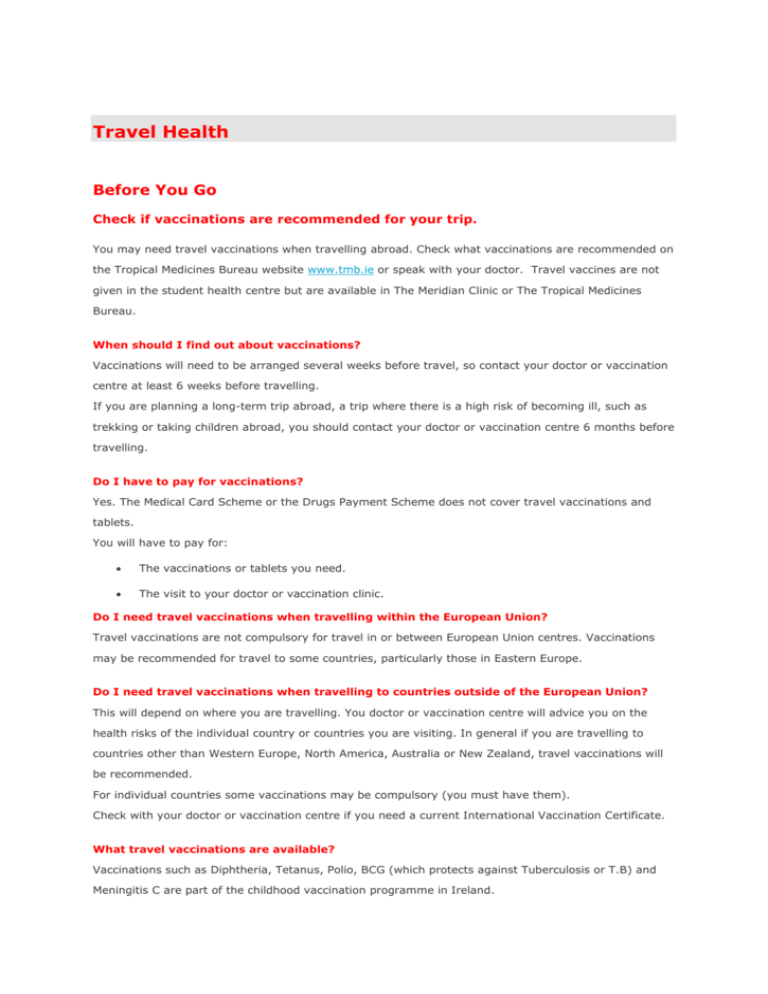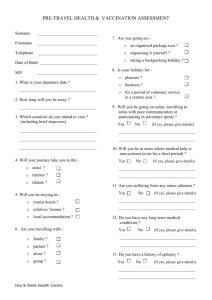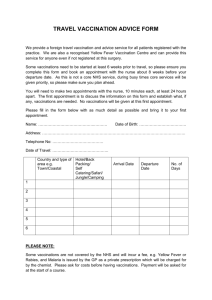Travel Health
advertisement

Travel Health Before You Go Check if vaccinations are recommended for your trip. You may need travel vaccinations when travelling abroad. Check what vaccinations are recommended on the Tropical Medicines Bureau website www.tmb.ie or speak with your doctor. Travel vaccines are not given in the student health centre but are available in The Meridian Clinic or The Tropical Medicines Bureau. When should I find out about vaccinations? Vaccinations will need to be arranged several weeks before travel, so contact your doctor or vaccination centre at least 6 weeks before travelling. If you are planning a long-term trip abroad, a trip where there is a high risk of becoming ill, such as trekking or taking children abroad, you should contact your doctor or vaccination centre 6 months before travelling. Do I have to pay for vaccinations? Yes. The Medical Card Scheme or the Drugs Payment Scheme does not cover travel vaccinations and tablets. You will have to pay for: The vaccinations or tablets you need. The visit to your doctor or vaccination clinic. Do I need travel vaccinations when travelling within the European Union? Travel vaccinations are not compulsory for travel in or between European Union centres. Vaccinations may be recommended for travel to some countries, particularly those in Eastern Europe. Do I need travel vaccinations when travelling to countries outside of the European Union? This will depend on where you are travelling. You doctor or vaccination centre will advice you on the health risks of the individual country or countries you are visiting. In general if you are travelling to countries other than Western Europe, North America, Australia or New Zealand, travel vaccinations will be recommended. For individual countries some vaccinations may be compulsory (you must have them). Check with your doctor or vaccination centre if you need a current International Vaccination Certificate. What travel vaccinations are available? Vaccinations such as Diphtheria, Tetanus, Polio, BCG (which protects against Tuberculosis or T.B) and Meningitis C are part of the childhood vaccination programme in Ireland. Check that you are up to date with these vaccinations before you travel. Check with your doctor if you need a ‘booster’ (extra) vaccination before travelling. Keep a written record of all your vaccinations. If you travel regularly you may need ‘booster’ vaccinations – some vaccinations only protect for a specific length of time. Specific travel Vaccinations Yellow Fever Yellow fever is a viral infection spread by mosquitoes. It is common in areas of Africa around the equator and in areas of South America. Typhoid Typhoid is a bacterial infection of the intestine, which causes diarrhoea, vomiting and fever. It is important to follow the general health advice for preventing diarrhoea above. Hepatitis A Hepatitis A is a viral infection, which is common in many countries. It is important to follow the general health advice for preventing diarrhoea above. Hepatitis B Hepatitis B is a viral infection, which is spread by contact with body fluids such as blood, semen and vaginal fluids. It is important to follow the general health advice for preventing Sexually Transmitted Infections above. Meningococcal Vaccines Meningococcal meningitis is a bacterial infection caused by different groups of the Meningococcal bacteria. Vaccination against various groups is available, check with your doctor. Tick borne Encephalitis This is a viral infection spread by ticks usually in spring to early autumn. Clothing that covers as much skin as possible and using insect repellent are also important. Japanese Encephalitis This is viral infection, which is spread by mosquitoes. It occurs widely in South East Asia, particularly during the monsoon season. Check for outbreaks of illness or diseases in the countries you are visiting. Outbreaks of illness or disease in the countries you are visiting may put restrictions on your travel plans or you may need to take extra precautions to prevent illness. Check out the latest information from the Tropical Medicines Bureau website above or contact your travel agent. Arrange Medical Insurance The European Health Insurance Card (EHIC) As an Irish resident you are entitled to get healthcare through the state health care scheme of European Union (UN) countries, European Economic Area (EEA) countries and Switzerland if you become ill or have an accident while on a temporary stay there. The EHIC card replaces the E111 and E128 forms. You may wish to consider private medical insurance as well as the EHIC because the EHIC does not cover transport costs back to Ireland, Extra travel and accommodation costs as a result of illness or accident. The cost of treatment in private health care setting. For the United Kingdom The EHIC is not needed to get necessary healthcare when visiting the United Kingdom (Northern Ireland, England, Scotland and Wales)although proof that you are ordinarily resident in Ireland, such as a driving licence or passport, is necessary. The EHIC does not allow you to travel abroad with the aim of getting healthcare through the state healthcare system of any of the countries covered Application forms are available from your local Community Care or Health Centre and on http://www.ehic.ie/ Countries Covered By the EHIC Austria Belgium Cyprus Czech Republic Denmark Estonia Finland France Germany Greece Hungary Italy Latvia Lithuania Luxembourg Malta Netherlands Poland Portugal Slovakia Slovenia Spain Sweden United Kingdom Iceland Liechtenstein Norway Switzerland For countries not covered by the European Health Insurance Card (EHIC) Medical Insurance is important. Check with your travel agent for the amount of cover you will need. Include enough cover to allow for the extra cost of travelling home in an emergency. Find out what steps you need to follow to get assistance and claim back costs of healthcare if ill abroad. Some countries such as Australia have special agreements with Ireland about health care, check with the embassy or consulate of the country you are travelling to. Pregnancy/Illness If you have any illness or are pregnant discuss your travel plans in detail with your doctor Make arrangements to bring enough supplies of any necessary medicines. Many airlines do not allow pregnant women to travel after the 36th week of pregnancy (or 32nd week for twins or more). Some airlines require a letter from your doctor or midwife confirming you are in good health, stating it’s been a normal pregnancy and confirming expected date of delivery, if travelling by air after 28th week of pregnancy. However flying by air itself does not have any negative effects on the pregnancy. Have a dental check-up If you will be away for more than a short period, have a dental check up before you go. It may be difficult and expensive to get treatment in the countries you visit. When you are away Diarrhoea/vomiting Diarrhoea affects up to 80% of people travelling abroad, particularly to countries where there are poorly developed systems or no systems for managing water and sewage. Carefully choosing and preparing food and drink is the best way to prevent diarrhoea. Always peel or shell fruit and vegetables before eating Always boil tap water or un-bottled water before drinking or using to wash food or cutlery. Make sure that cooked food has been thoroughly and freshly cooked. Wash your hands in hot water after using the toilet and before preparing food. Use bottled water to brush teeth. Boil unpasteurised (raw) milk before use. The following foods are high risk for causing diarrhoea, so avoid them: o Unpasteurised milk o Non-bottled drinks, including tap water o Ice cubes o Uncooked food, such as salads, cold meats o Dishes containing raw or undercooked eggs o Ice-cream from unreliable sources o Undercooked shellfish such as oysters, mussels, clams What to do if you get diarrhoea Diarrhoea increases your risk of becoming dehydrated, particularly in warm countries. If you get diarrhoea: Drink plenty of bottled water or bottled non-alcoholic drinks, boiled or treated water or weak tea. If diarrhoea continues for more than 1 day, use oral rehydration salts. Contact a doctor if the diarrhoea lasts for more than 3 days, or if there are very frequent watery bowel movements, blood in stools, repeated vomiting. If you have a fever with the diarrhoea contact, a doctor immediately. Remember young children and older people may become dehydrated very quickly. Be sun smart Strong sunlight can cause premature ageing of the skin, painful sunburn and skin cancer. A tan is a sign that damaged skin is trying to protect itself from the sun’s ultraviolet rays. Even when you have a tan you can still get sunburn. So be sun smart. Cover Up Wear a wide brimmed hat and a t-shirt. Wear sunglasses. Shade Avoid being out in the sun between 11am and 3pm. Sunscreen Use sunscreen of sun protection factor (SPF) 15 or higher, with UVA and UVB protection. Re-apply sunscreen every 2 hours. Children's skin is very sensitive to the sun's rays. All children should be protected in the sun. Babies should be kept out of the sun entirely. Skin Cancer – what to look out for New lumps and growths A sore that does not heal Change in colour, shape, size of moles or pigmented spots. Scaling red areas which bleed easily. Many skin changes will be harmless, but if any change persists contact a doctor. Take care to avoid other health risks As well as travel vaccinations there are a number of things you can do to protect your health when travelling abroad and prevent illnesses such as: Sexually Transmitted Infections HIV/AIDS Malaria Rabies Sexually Transmitted Infections (STI’s) STI’s are infections, which can be passed on from one person to another during sexual contact. Anyone who is sexually active and not in a monogamous relationship is at risk of being infected with an STI Bacteria, viruses and other microscopic organisms, which are present in the blood, semen, body fluids or pubic area of an infected person, cause STI’s. Most STI’s (except HIV/AIDS) can be cured with treatment, once they have been diagnosed. How to avoid infection with STI’s Abstention: STI’s are passed on by sexual contact with an infected person. Not having sex at all is a certain way of avoiding infection. Limit Partners: Nobody has a natural immunity to STI’s. A once only contact may be the cause of infection. Also, the more partners you have the greater your risk of catching an infection. Use a Condom: For sexually active people who are not in a monogamous relationship, the proper use of a good quality condom will significantly reduce the risk of infection. Condoms, however, do not offer total protection as they may fail during use. Remember, if you take drugs or alcohol, it increases your chances of taking part in activities that carry a risk of HIV, Hepatitis and Sexually Transmitted Infections (STI’s) being passed on. Signs and Symptoms of STI’s Most STI’s have no signs or symptoms. People who are infected look perfectly healthy. If you are sexually active and notice any of the following symptoms, contact a doctor: Unusual discharge from the penis or vagina Pain when passing urine Unusual sores or blisters in the genital area Itching or irritation in the genital area Pain during sex The sooner an STI is diagnosed and treated, the greater the chance of it being completely cured without any complications. HIV HIV (Human Immunodeficiency Virus) is the infection that causes AIDS (Acquired Immune Deficiency Syndrome) and it’s a blood borne infection. There are no HIV free areas of the world. Reduce your risk of contracting HIV by: Always wearing a condom and limiting your sexual partner’s Avoid using drugs and alcohol. If you take drugs with alcohol, it increases your chances of taking part in activities that carry a risk of HIV and other blood borne infections such as STI’s and Hepatitis B. Reduce your chances of needing a blood transfusion by avoiding accidents If you need a blood transfusion, check with the doctor that the blood has been screened. Avoid using needles or devices that puncture the skin, for example in acupuncture, tattooing or electrolysis. If you do need to have an injection for medical reasons, check that the new needle and syringe are used. Avoid dental treatment in countries where sterilisation may not be adequate. Malaria Malaria is caused by bites from infected mosquitoes. It is endemic in mosquitoes in African, Asian and South American countries. If you are travelling to or through Africa, Asia or South America asks your doctor for anti-malarial tablets. You may need to take the tablets for some time before you travel, so check with your doctor when and how to take your tablets. As well as taking anti-malarial tablets, avoid mosquito bites by: Covering your arms and legs when outdoors after sunset, preferably using light coloured clothing. Sleep in screened accommodation or use mosquito nets. Use insect repellents Rabies Rabies is extremely rare and is endemic in dogs, cats and other animals in most parts of the world including Continental Europe. It is spread through bites or licks on broken skin from infected animals. You should not bring pets to countries where rabies is endemic, and you should not bring animals to Ireland from these countries. Care should be taken when in close contact with animals abroad. If you are going to be in close contact with animals when abroad, speak with your doctor or vaccination clinic about vaccination. If you’re bitten or scratched by an animal while abroad, contact a doctor at once. Vaccination immediately after a bite or scratch considerably reduces your chances of getting rabies. When you return from travelling abroad If you feel unwell, particularly if you have a fever, persistent diarrhoea, persistent cough, vomiting, jaundice (yellowing of the eyes and skin), in the weeks after being abroad: Contact your doctor Tell your doctor about the countries you visited, as it may be important. If you had unprotected sex while abroad or are worried you may have a sexually transmitted infection: Visit your GP or STI clinic. It is important to receive treatment early, and your visit will be strictly confidential. If you have a chronic illness: Visit your doctor for a check up. If you have a fever after returning from an area where malaria is common – contact your doctor immediately And finally enjoy your holidays...




